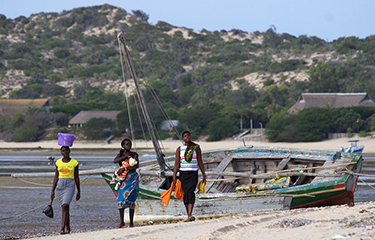Global investment bank and financial services firm Credit Suisse will pay penalties of over USD 500 million (EUR 429 million) in what anti-corruption experts are calling “the most egregious corruption offense of the decade.”
Credit Suisse admitted to conspiring to commit fraud in a Mozambique tuna-fishing project and, in a coordinated global resolution with the U.S. Securities and Exchange Commission, the U.K. Financial Conduct Authority, and an enforcement action by Switzerland’s Financial Market Supervisory Authority, the company will pay penalties totaling over USD 475 million (EUR 469.7 million).
On 19 October, Credit Suisse entered into a deferred prosecution agreement with the U.S. Department of Justice in connection with criminal information filed in the U.S. District Court for the Eastern District of New York, where the bank was charged with conspiracy to commit wire fraud. The DOJ confirmed Credit Suisse plead guilty to one count of conspiracy to commit wire fraud.
The DOJ said on 19 October that both Credit Suisse Group AG and its subsidiary, Credit Suisse Securities, “admitted to conspiring to commit wire fraud by defrauding U.S. and international investors in a USD 850 million (EUR 730 million) loan to finance a tuna-fishing project in Mozambique.”
“After taking account of crediting by the department of the other resolutions, Credit Suisse will pay approximately USD 475 million (EUR 407.9 million), as well as restitution to victims in an amount to be determined by the court,” the DOJ said.
According to Justice Department Criminal Division Assistant Attorney General Kenneth A. Polite Jr., the company misled investors.
“Among other things, Credit Suisse Group AG, CSSEL, and their co-conspirators deceived investors by hiding information about the risk that loan proceeds were used for illegal purposes in connection with the restructuring of the loan,” Polite said.
Between 2013 and March 2017, Credit Suisse – through its subsidiary CSSEL – and its collaborators used U.S. wires and the U.S. financial system to defraud investors in securities related to a Mozambican state-owned entity, Empresa Moçambicana de Atum (EMATUM), which Mozambique created to develop a state-owned tuna-fishing project, according to the DOJ.
“Credit Suisse, through its employees and agents, conspired to defraud investors and potential investors in EMATUM by making numerous material misrepresentations and omissions relating to, among other things, the use of loan proceeds, kickback payments to CSSEL bankers, and the risk of bribes to Mozambican officials and the existence and maturity dates of debt owed by Mozambique, including another private loan that Credit Suisse arranged for a Mozambique state-owned entity (ProIndicus) and a different private loan another bank arranged with Credit Suisse’s knowledge,” The DoJ said.
Despite the illicit financial dealings, “Credit Suisse represented to investors that the loan proceeds would only be used for the tuna-fishing project.”
The fraud diverted the loan proceeds from investors with the project’s contractor, Lebanon- and U.A.E.-based ship-builder Privinvest, paying kickbacks of approximately USD 50 million (EUR 42.9 million) to CSSEL bankers and bribes totaling approximately USD 150 million (EUR 128.8 million) to senior Mozambican government officials.
In its own announcement, FCA said on 19 October Credit Suisse is guilty of serious financial crimes related to due-diligence failings in relation to loans worth over USD 1.3 billion (EUR 1.1 billion) for Mozambique’s tuna-fishing industry project, and has fined it GBP 147 million (USD 202.7 million, EUR 174 million). The bank will also excuse USD 200 million (EUR 171.7 million) of debt owed by Mozambique as a result of the scandal-ridden loans.
“The FCA’s fine reflects the impact of these tainted transactions which included a debt crisis and economic harm for the people of Mozambique,” FCA Executive Director of Enforcement and Market Oversight Mark Steward said. “The fine would have been higher if not for Credit Suisse agreeing to provide the debt write-off of USD 200 million [EUR 171.7 million].”
FCA said Credit Suisse had enough information to know the risks related to the loans, but failed to properly scrutinize them.
“Time and again there was insufficient challenge within Credit Suisse, or scrutiny and inquiry in the face of important risk factors and warnings,” FCA said.
Mozambican authorities now claim the minimum total of bribes paid in respect of the two loans is around USD 137 million (EUR 117.6 million), according to the FCA.
Former World Bank anti-corruption expert Richard E. Messick previously termed the Mozambican scandal “the most egregious corruption offense of the decade.”
“It will take years to repair the damage done by these hidden debts [and] full recovery may never be realized,” Messick said.
In Mozambique, 19 suspects, among them Ndambi Guebuza (the son of former Mozambican President Armando Guebezal), state security and intelligence service officials, and government functionaries and bankers, have been charged with blackmail, forgery, embezzlement, and money laundering.
Since 2018, Mozambique has fought to have former finance minister Manuel Chang - who was also implicated in the fraud - extradited from South Africa to Mozambique to face charges related to the scandal.
In Switzerland, the government said it has opened a money-laundering case in related to the scandal after a Swiss NGO lodged a complaint. In an agreement with Switzerland’s Financial Market Supervisory Authority, Credit Suisse will be required to submit to enhanced compliance and self-reporting measures, including the imposition of a third-party monitoring system on the bank’s transactions, risk management, internal control systems, and all existing transactions with “financially weak and corruption-prone states and companies."
Photo courtesy of the World Bank







